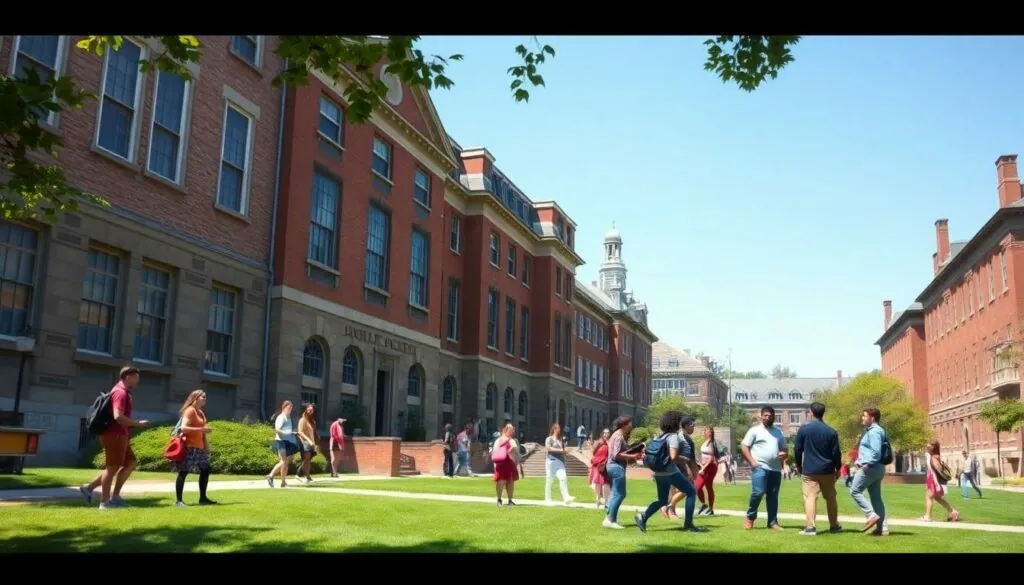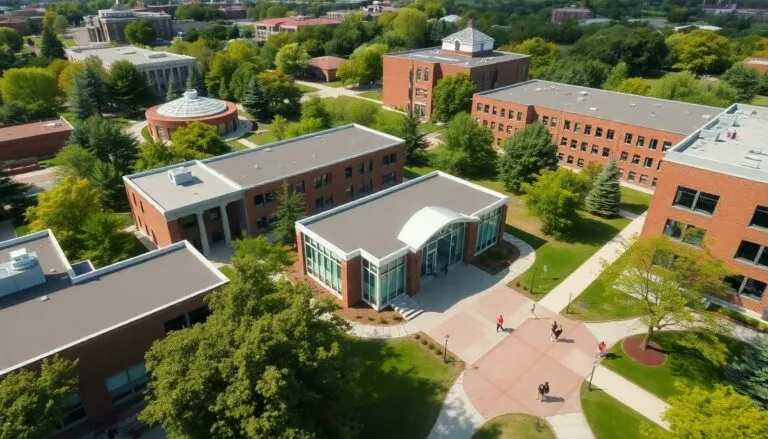Table of Contents
ToggleWhen considering a college, tuition often feels like a game of hide-and-seek—except the numbers are hiding, and the seekers are left scratching their heads. At Holy Cross College, understanding tuition isn’t just about dollars and cents; it’s about investing in a transformative experience. With a rich history of academic excellence and a vibrant campus life, students often find that the value far outweighs the cost.
But let’s be real: no one wants to break the bank just to earn a degree. Holy Cross College offers a variety of financial aid options and scholarships that can make this dream a reality. So whether you’re eyeing a future in business, education, or the arts, knowing the ins and outs of tuition can help you make an informed decision. After all, who wouldn’t want to get a stellar education without selling a kidney?
Overview of Holy Cross College Tuition
Understanding tuition at Holy Cross College involves examining various rates for different programs. Tuition varies by program, with clear distinctions between undergraduate and graduate offerings.
Tuition Rates for Undergraduate Students
Undergraduate tuition at Holy Cross College is set at $55,270 per academic year. This rate encompasses all full-time students enrolled in undergraduate programs, covering essential academic resources. The college provides opportunities for financial aid and scholarships to offset costs, which many students take advantage of. Adjustments may occur based on specific programs or residency status. An estimated 40% of undergraduates receive need-based aid, decreasing the net cost for many.
Tuition Rates for Graduate Programs
Graduate tuition rates reflect program differences, starting at $1,200 per credit hour. Each graduate program features distinct requirements and structures, which may influence total tuition costs. Students often benefit from assistantships and scholarships specifically designed for graduate studies, aiding affordability. Financial aid options also remain available, supporting the goal of making graduate education accessible. Overall, graduate tuition at Holy Cross College serves to provide specialized learning experiences.
Additional Fees and Expenses
Understanding the full cost of attending Holy Cross College goes beyond tuition itself. Various additional fees and expenses significantly affect the overall financial commitment.
Room and Board Costs
Room and board costs present a vital component of college expenses. The average cost for housing at Holy Cross College is approximately $16,000 per academic year, encompassing traditional dorm living and apartment options. Meal plans add about $6,200 yearly, offering flexibility in dining choices across campus. Students should factor these expenses into their budgeting, as they contribute substantially to the total cost of attendance.
Tuition Insurance Options
Tuition insurance provides a safeguard for students against unexpected withdrawals due to medical emergencies. Coverage costs around 1% to 2% of total tuition and fees. Enrolling in a plan protects the investment made in education, offering refunds for a portion of tuition if a student must leave for valid reasons. This option helps alleviate financial worries, particularly for those who encounter unforeseen circumstances during their studies at Holy Cross College.
Financial Aid Opportunities
Financial aid plays a crucial role in making education at Holy Cross College more attainable. Various options exist for students seeking assistance.
Scholarships Offered
Holy Cross College provides a range of scholarships catering to diverse student needs and achievements. Merit-based scholarships celebrate academic excellence, while need-based options support those facing financial challenges. Students can qualify for specific awards based on their intended major, ensuring targeted support for various fields. The college also offers endowed scholarships funded by alumni and donors, which further enhance affordability. Timely application is essential, as deadlines for scholarship opportunities often align with admission dates.
Federal and State Financial Aid
Students can leverage federal and state financial aid programs to ease tuition costs. The Free Application for Federal Student Aid (FAFSA) serves as the gateway for federal aid, including grants and loans. State programs provide additional funding based on eligibility criteria, helping students cover tuition and living expenses. Many students qualify for Pell Grants, demonstrating the significant impact of federal aid in reducing overall financial burdens. Additionally, state grants require residency or other conditions, thus offering tailored assistance that meets local needs.
Comparison with Other Colleges
Comparing Holy Cross College tuition with peer institutions reveals significant insights into the cost structure and value proposition offered to students.
Holy Cross College vs. Peer Institutions
Holy Cross College’s undergraduate tuition stands at $55,270 per year, positioning it within the competitive range of similar colleges. Institutions like Boston College and Villanova University have comparable tuition rates, often ranging from $55,000 to $60,000 annually. Need-based aid benefits roughly 40% of Holy Cross undergraduates, an impactful statistic that enhances affordability. While some local options may appear cheaper, the comprehensive student experience at Holy Cross, including academic support and campus life, plays a key role in its value. Auxiliary fees, including room and board, average $16,000, which influences overall financial comparisons with other colleges.
Cost of Living in the Area
Cost of living in the Worcester area significantly affects total expenses for students attending Holy Cross College. The local living expenses average around $28,000 yearly, encompassing housing, food, transportation, and personal items. While off-campus housing may vary, many students opt for on-campus accommodations, which help streamline costs. Proximity to amenities, including grocery stores and recreational facilities, contributes to overall satisfaction and expenses. Living in a vibrant city like Worcester often provides students access to cultural events and job opportunities that enhance their college experience while balancing the financial aspects.
Value of Education at Holy Cross College
Holy Cross College offers an educational experience that transcends its tuition costs. The investment students make often pays off significantly over time.
Return on Investment
Return on investment at Holy Cross College reflects a strong connection between education and future earnings. Graduates tend to enter diverse fields such as business, education, and the arts, consistently reporting competitive salaries. Reports indicate that alumni earn an average starting salary of approximately $59,000 annually. Access to a powerful alumni network also enhances opportunities for mentorship and job placements. Furthermore, the college’s commitment to academic excellence and a vibrant campus community cultivates a well-rounded education, which adds long-term value. With various financial aid options, students can minimize their initial financial burden, improving their overall return on investment.
Graduate Employment Rates
Graduate employment rates from Holy Cross College exhibit impressive outcomes. Data shows that over 90% of graduates secure employment within six months of earning their degrees. Many alumni find positions in reputable organizations, reflecting the quality of education and resources available at the college. Internship programs and networking events further boost graduates’ visibility in competitive job markets. Career services also provide personalized support, helping students refine their skills and connect with potential employers. These factors combined create a strong propensity for employment, illustrating the effectiveness of Holy Cross’ educational initiatives.
Conclusion
Holy Cross College offers a compelling educational experience that extends well beyond its tuition costs. With a strong emphasis on academic excellence and a vibrant campus life students find value that often outweighs financial concerns. The availability of financial aid and scholarships makes this prestigious institution more accessible to a diverse range of students.
While the listed tuition may seem high at first glance the comprehensive support services and robust alumni network contribute significantly to a student’s long-term success. Graduates not only benefit from competitive starting salaries but also from meaningful connections within their fields. Ultimately the investment in education at Holy Cross College is one that can yield substantial returns both personally and professionally.








